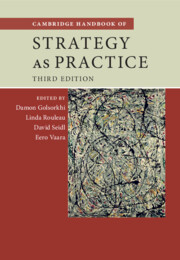Description
Cambridge Handbook of Strategy as Practice (3rd Ed.)
Coordinators: Golsorkhi Damon, Rouleau Linda, Seidl David, Vaara Eero
Language: English
Subject for Cambridge Handbook of Strategy as Practice:
Publication date: 08-2024
1000 p. · Hardback
1000 p. · Hardback
Description
/li>Contents
/li>Biography
/li>
Now in its third edition, this Handbook is essential for students and researchers in Strategic Management and Organizational Theory and Behaviour. The Strategy as Practice approach moves away from the disembodied and asocial study of firm assets, technologies and practices, towards the study of strategizing as an activity. Strategy is understood as something people do rather than something a firm has. This perspective explores how strategizing contributes to an organizations' daily operations at all levels. Through detailed empirical studies of the everyday activities and practice of people engaged in strategizing, the Handbook investigates who strategists are, what strategists do, how they do it, and what the consequences of their actions are. Featuring new authors and additional or fundamentally updated and revised chapters, this edition provides a state-of-the-art overview of recent reflections and works in this rapidly growing stream of strategic management, whilst also presenting a research agenda for the next decade.
Introduction: What is Strategy as Practice?; Part I. Ontological and Epistemological Questions: 1. Epistemological alternatives for researching Strategy as Practice: building and dwelling worldviews; 2. How is strategy made? A Heideggerian onto-epistemological framework for studying Strategy as Practice; 3. Constructivist paradigms and their relevance for Strategy as Practice research; 4. The ongoing challenge of developing cumulative knowledge about Strategy as Practice; 5. Practical relevance of practice-theoretical research on strategy; Part II. Theoretical Resources: Social Theory: 6. Structuration theory: Giddens and beyond; 7. An activity theory approach to Strategy as Practice; 8. A Bourdieusian perspective on strategizing; 9. A Wittgensteinian perspective on strategizing; 10. A Foucauldian perspective on strategic practice: strategy as the art of (un)folding; 11. A narrativity approach to Strategy as Practice: Strategy-making from texts and narratives; 12. Actor-network theory and Strategy as Practice; 13. A dramaturgical framework for Strategy as Practice; 14. Schatzki's practice theory and Strategy as Practice; 15. An economies-of-worth perspective on Strategy as Practice: Dealing with strategic pluralism through legitimation, localization, and materialization; 16. Strategy as a performative practice: a self-referential, knowledge-based perspective; Part III. Theoretical Resources: Organization and Management Theories: 17. An institutional perspective on Strategy as Practice; 18. Identity work as a strategic practice; 19. Sensemaking in Strategy as Practice: from a phenomenon towards a theory?; 20. Routine dynamics and connections to Strategy as Practice; 21. The communicative constitution of strategy-making: exploring fleeting moments of strategy; 22. A social-symbolic work perspective on Strategy as Practice: the objects of strategy work; 23. Relating Strategy as Practice to the resource-based view, capabilities perspectives and micro-foundations approaches; 24. Analytical frames for studying power in Strategy as Practice and beyond; 25. Strategy as Practice and the critical eye; Part IV. Methodological Resources: 26. Using ethnography in Strategy as Practice research; 27. Action research as an impactful approach to study Strategy as Practice; 28. Studying strategizing through biographical interviews or narratives of practices; 29. Using photographic methods in Strategy as Practice research; 30. A critical discursive approach to Strategy as Practice research; 31. Studying Strategy as Practice through historical methods; 32. Quantitative methods in Strategy as Practice research; Part V. Substantive Topic Areas: 33. Strategic planning as practice; 34. Meetings and workshops as strategy practices; 35. The role of materiality in the practice of strategy revisited; 36. Participation in strategy work; 37. Open strategy as a new form of strategizing; 38. The role of emotions in strategizing; 39. Temporality in Strategy as Practice; 40. Multimodality in Strategy as Practice research; 41. The role of play in strategizing; 42. Feminist perspectives on doing Strategy as Practice research; 43. At the interface of extreme contexts and Strategy as Practice.
Damon Golsorkhi is Associate Professor of Strategic Management at emlyon Business School, France.
Linda Rouleau is Professor of Strategy and Organization Theory at HEC Montréal.
David Seidl is Professor of Organization and Management at the University of Zurich, Switzerland.
Eero Vaara is Professor in Organisations and Impact at Saïd Business School at University of Oxford.
Linda Rouleau is Professor of Strategy and Organization Theory at HEC Montréal.
David Seidl is Professor of Organization and Management at the University of Zurich, Switzerland.
Eero Vaara is Professor in Organisations and Impact at Saïd Business School at University of Oxford.
© 2024 LAVOISIER S.A.S.
These books may interest you

Cambridge Handbook of Open Strategy 156.12 €



